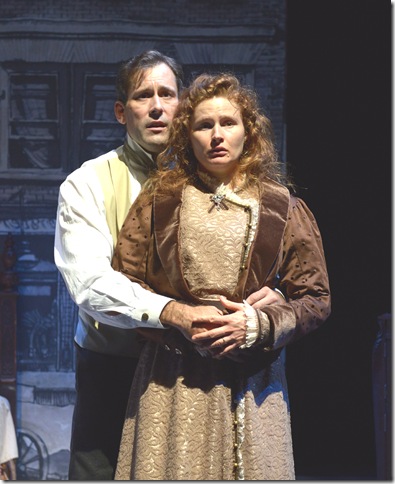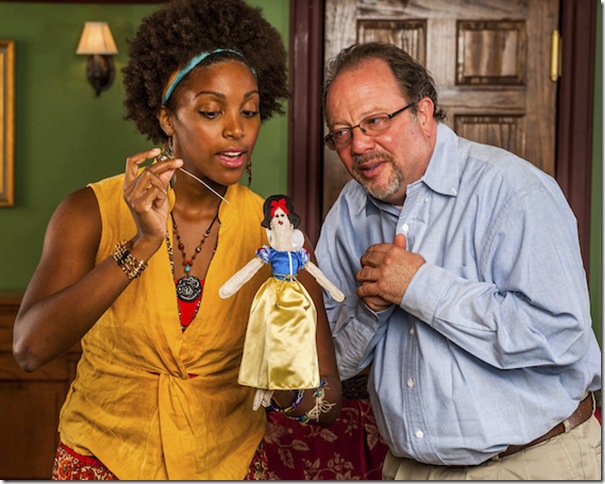“Erratic” is the word that comes to mind to describe the inaugural season of Boca Raton’s Wick Theatre. But when it is good, the eight-month old company can compete with any troupe in South Florida, as it proves with its current production of the Fats Waller revue, Ain’t Misbehavin’.
The 1978 Tony Award winner set the gold standard for composer tribute songfests and by adhering closely to the show’s original staging, it remains a fresh and lively as it was 36 years ago. This is due in no small part to director-choreographer Ron Hutchins casting five performers who are longtime veterans of this musical.
Roly-poly Waller, who described himself as “my mother’s 285 pounds of jam, jive and everything,” was a piano player/composer/recording artist of the 1920s, ’30s and ’40s, who favored jazzy, good-time tunes, often with playful lyrics. In addition, the performers give them a tonal spin of sassy irreverence. The show’s title, taken from a 1929 pop song, was surely chosen ironically, for the cast misbehaves with bravado.
Mountainous Phillip Boykin, a 2012 Tony nominee for Porgy and Bess, is the embodiment of Waller, though the rest of the company represents other qualities of the composer as well. Boykin is surprisingly light on his feet and buoyantly comic, as seen in the winking way he puts across the snarky “Your Feet’s Too Big.”
Everyone gets solo opportunities, with loose-limbed Reggie Whitehead making an asp of himself slithering through “The Viper’s Drag,” a hazy salute to demon marijuana. Debra Walton is all fluttery hands and high kicks, puckishly belying the lyric to “Keepin’ Out of Mischief Now.” Plus-sized Shirley Tripp sings of the spell of love in “I’ve Got a Feeling I’m Falling,” while Joy Lynn Jacobs bounces between a squeak and a growl on “Squeeze Me” and “Find Out What They Like.”
Hutchins keeps the cast in motion for most of the evening, with dance steps based on Arthur Faria original Broadway choreography. But in the stunning 11 o’clock number, “Black and Blue,” the five or them sit motionlessly and deliver the sobering racial lament, a chilling change from all the upbeat material.
“Ain’t Misbehavin’ ” marks the first time the Wick features a live band, a major step forward, particularly with stride piano virtuoso Charles Creath leading an accomplished six-man combo. The musicians really swing on the peppy entr’acte, their own spotlight moment.
The band and the performers mesh well at the Wick, where the joint is jumpin’ with the sounds of Fats Waller, reason enough to head to the Boca playhouse. If you need another reason, Palm Beach County’s own Avery Sommers —- herself an Ain’t Misbehavin’ alumna — appears in the post-show lobby cabaret throughout the run of this final production of the season.
AIN’T MISBEHAVIN’, The Wick Theatre, 7901 N. Federal Highway, Boca Raton. Through Sunday, June 1. $58. (561) 995-2333.
* * *
Albee. Ibsen. Shaw. Miller. Steinbeck. Karoline Leach.
Do not be embarrassed if you are unfamiliar with the last playwright on that list, for Palm Beach Dramaworks has switched gears from its usual showcase of classic plays by major dramatists for a relatively recent, relatively unknown and — sorry to say — relatively minor work, Tryst.
Billed as a psychological thriller, it is a battle of wits, a question of whom you trust in a cat-and-mouse game between a con man and his victim. The former is based on an real-life criminal who preyed on lonely women, pretending to marry them, then taking whatever money and valuables they possessed.
Here he calls himself George Joseph Love, a self-assured clothes horse in Edwardian London, ever on the prowl for his next pigeon. He soon finds her in Adelaide Pinchin — a fictional composite of his “wives” — a milliner’s assistant so gullible, or perhaps so emotionally scarred, that she allows herself to be swept off her feet and married to Love in two days’ time.
On their wedding night, as Adelaide balks at physical contact, Love starts to realize what a pitiful case he has gotten himself involved with and Tryst begins going off the rails of plausibility. Rather than seeing her as an easier mark than usual to fleece and flee, Love is drawn closer to Adelaide. She eventually sees through him, but rather than growing more ill-at-ease, she become more self-confident, while Love goes through a meltdown. Curious, indeed.
Although the role is perplexing at best, Claire Brownell (seen previously at Dramaworks in Exit the King) manages to craft a fine performance as a woman of no social skills, nervously chattering away as Love woos her. Even in the latter going, as Adelaide gets the upper hand, Brownell almost makes that reversal believable, too.
While Jim Ballard had a few rough moments wrestling with his lines on opening night, he knows how to ooze charm and lie through his teeth, even if the character’s stories are often transparently false. Ballard has the more linear arc, he tells us from the top that he is out to con Adelaide, and being so experienced at it, it remains a puzzle why he becomes so unhinged.
Tryst is hardly the “theater to think about” that Dramaworks prides itself on. If anything, it is “theater not to think too hard about.”
TRYST, Palm Beach Dramaworks, 201 Clematis St., West Palm Beach. Through Sunday, June 8. $60. (561) 514-4042.
* * *
Christopher Durang is adept at many styles of comedy, but his default mode is parody, with wildly manic plays that springboard off of Dostoyevsky, Dickens, Tennessee Williams and iconic movies. Last season on Broadway — that home to mainstream entertainment where his more offbeat material rarely resides — he won the best play Tony Award for Vanya and Sonia and Masha and Spike, Durang’s take on the works of Anton Chekhov.
The early 20th-century Russian master insisted that his dour plays of unhappy people on the cusp of social and political revolution were also comedies, but if laughs were his aim — as they rarely were — he could learn a few things from Durang. Vanya and Sonia and, etc. is a messy piece of writing that often twists itself into knots to earn a guffaw, but there is no denying it is funny.
And occasionally insightful about the human condition. Surely Chekhov would be flattered by the homage, and probably a little jealous too.
The cast-of-characters title describes three grown siblings, all named by their college professor and community theater aficionado parents who were clearly fans of Chekhov.
Vanya and Sonia live loveless, lonely lives in a shared home in Bucks County, Pa. Masha is the family breadwinner, a much-divorced, aging movie star who arrives suddenly with her boy toy Spike in tow. Tired of footing the bills, Masha announces her intention to sell the family estate — OK, the house — out from under her brother and sister, a potential crisis that echoes a key Chekhovian theme.
Masha’s arrival and the ensuing upheaval had been predicted by the takes-no-guff black housekeeper, a self-proclaimed oracle named Cassandra (Jade Wheeler) with a penchant for voodoo. As you might guess, she has little basis in Chekhov, and seems to be from a whole different play, but Durang found the character funny and that is justification enough. Completing the cast is a sylph-like ingenue from the neighborhood named Nina — as in The Seagull — who yearns to be an actress. Her youth alone is enough to incur Masha’s wrath, but when she attracts Spike’s attention, Masha flies into a jealous rage.
Spike has no antecedent in the annals of Chekhov, but that does not stop New World School of the Arts student Domenic Servidio from stealing every scene he is in. Yes, he happens to have a well-toned body and the role calls for him to wear next to nothing most of the time, but also notice the comic nuances he brings to the empty-headed hunk.
The weekend climaxes with a costume party at a nearby, offstage, home. Masha came prepared with a cartoon-perfect outfit as Disney’s Snow White and dwarf mufti for her sibs. Sonia goes instead as a tiara-toting royal, sounding like Maggie Smith from Neil Simon’s California Suite. (Don’t ask.)
The costume and the accent attract a guest at the party and the high point of Laura Turnbull’s performance as dumpy Sonia is a phone call the next day that captures why she has been alone most of her life.
The second act’s acme is a lengthy rant by Avi Hoffman (Vanya) about the bygone yesterdays of Howdy Doody and Ozzie and Harriet, the days before texting and the Internet. The monologue seems to come out of nowhere, but Hoffman is comically volcanic with it, before slipping back into Vanya’s subdued self. Another comic set piece is the reading of Vanya’s unfinished avant-garde play, which gives Hayley Bruce (Nina) a chance to shine, even if the sequence wears out its welcome quickly.
Director Joe Adler rarely dabbles in such overtly comic material, but he shows here that he can handle its tricky tones. Lyle Baskin heads the design crew with a house set of substance and character, while Ellis Tillman’s costumes are on target and whimsical. Durang’s Tony Award was earned in part by the terrific Broadway cast of Vanya and Sonia and Masha and Spike, but GableStage proves that the play works just fine with a company of mere mortals.
VANYA AND SONIA AND MASHA AND SPIKE, GableStage, 1200 Anastasia Ave., Coral Gables. Through Sunday, June 15. $40 – $55. (305) 445-1119.


